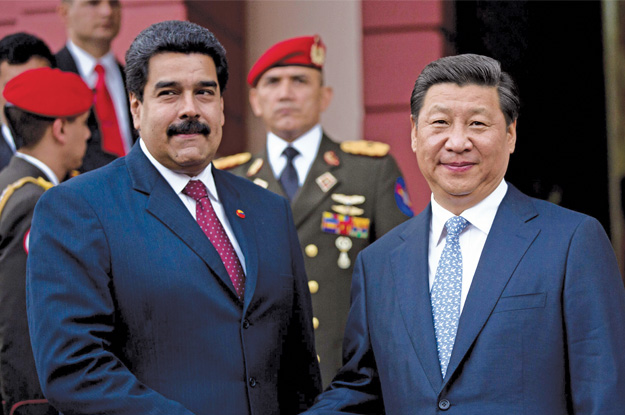
The Captain of Industry | The Musician | The Entrepreneur
The Educator | The Oil Expert | The Politician | The Economist
The Humanitarian | The Rights Advocate | The Foreign Leader
This article is adapted from Americas Quarterly’s print issue on Venezuela after Maduro. | Leer en español
Of all the non-Venezuelans with a say in Venezuela’s future, Chinese leader Xi Jinping may be the most important.
Newly elevated in November by the 19th Party Congress and subsequently given the option of indefinite reelection, Xi now has consolidated power more aggressively and effectively than anyone since Mao Zedong — a critical development as China tries to figure out its next move in Venezuela.
By now, the story of Chinese involvement in Venezuela is well-known. Beijing granted Caracas tens of billions of dollars in loans to lock in access to its oil. Those funds have been squandered and stolen, first by Hugo Chávez and now by Nicolás Maduro and their cronies. Today’s Venezuela is not just bankrupt, but plagued by falling oil production and engaged in a fire sale of productive assets to service its debt. In response, China has softened some original terms, but Beijing continues to require that its debt be serviced with shipments of crude. Meanwhile, no new money for the Maduro government appears to be forthcoming from China, at least for the foreseeable future.
Why, then, is Xi so important to Venezuela’s recovery?
Because it is in no one’s interest, including China’s, that Venezuela collapse. Unlike Russia, China is not so much interested in the politics above ground; China seeks the resources below ground. As a strategic matter, China needs Venezuelan oil to flow, and for the rapid oil production declines of recent years to be reversed. This will not occur with the current government in charge in Caracas.
Graph: A closer look at Venezuela’s foreign ties
It is therefore in Beijing’s interest that Venezuela embark upon a political transition to a more representative, competent, sustainable government. And only Xi has the authority to engineer such a move, perhaps through the United Nations Security Council or other international body, once he realizes that overt or even tacit support of Maduro ultimately undermines rather than strengthens China’s strategic economic interests.
The transition won’t just be political in nature. Some analysts say Venezuela could need $50 billion per year for 10 years to truly get back on its feet.
The West has no particular appetite for such a large package. But Xi might, particularly if a plan for Venezuelan recovery is administered through either the AIIB or the BRICS Bank, both Chinese-led financial institutions, within the context of China’s global Belt and Road Initiative. As a strategic matter, this would lock in Chinese access to Venezuelan oil. It would seize hemispheric initiative from the United States. And it would establish once and for all the relevance of a competing global financial structure with China at the helm. Such an approach would be fully consistent with Xi’s desire globally to show that Western democracy cannot be considered superior to authoritarian political systems.
The upshot: China has the resources and Xi has the power to underwrite a Venezuelan recovery. Western democracies cannot mobilize resources in the same way. In the coming battle of global systems and ideas, Venezuela may become a test case — with Xi as a leading protagonist.
—
Farnsworth is vice president of AS/COA






